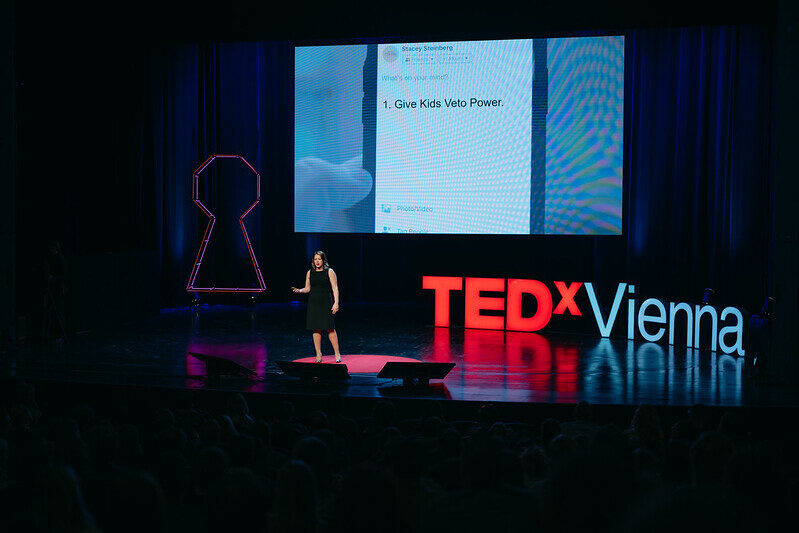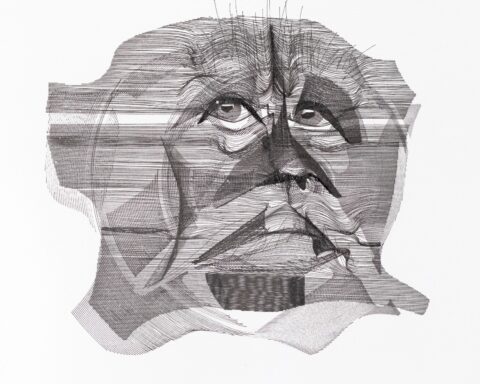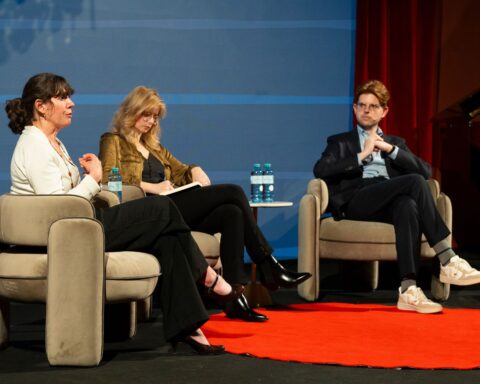When was the last time you shared your children’s pictures online or pictures and information on someone else’s child? How aware are you of your digital footprint and privacy? As a society, where do we draw the line between a parent’s right to share online and children’s privacy rights?
Stacey Steinberg, the supervising attorney for the Gator TeamChild Juvenile Law Clinic as well as Director for the Center on Children and Families at the University of Florida, shed light on “sharenting” during her talk at the TEDxVienna ‘Untold’ Event.
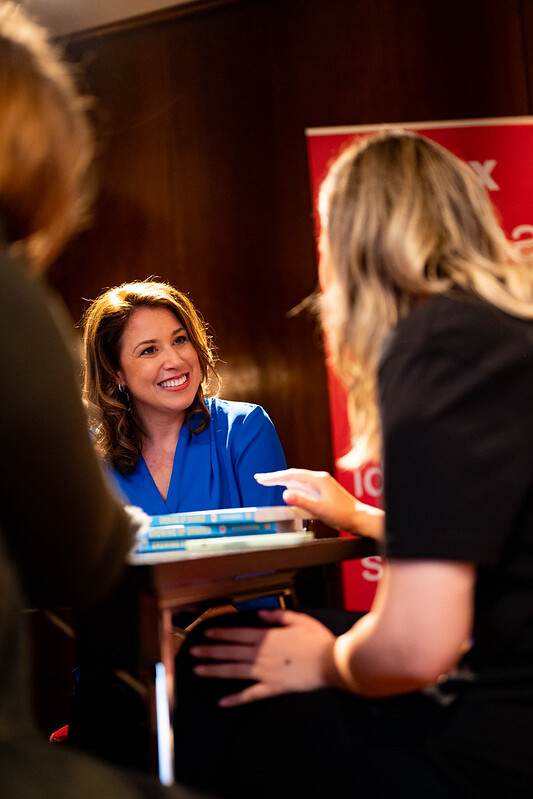
She talked about the intersection between a parent’s right to share pictures of their children online and a child’s right to privacy.
Steinberg also left audience members a lot to think about when it comes to ‘sharenting’ and how to be more mindful in what we share online.
I had the privilege to interview Stacey right after her talk and discuss the above questions in more detail.
Since she is also a first-generation college student (now a Law Professor) whose grandparents fled Europe during the Holocaust and arrived in the US after finding shelter as refugees at a displaced persons camp in Vienna, coming to Austria (and especially to Vienna) for the first time to give her first TED talk, was extra special for her.
We also talked about the journey of her book Growing Up Shared: How Parents Can Share Smarter on Social Media and What You Can Do to Keep Your Family Safe in a No-Privacy World.
Here’s the full interview with Stacey. Enjoy and (maybe) take some notes while you’re at it.
How do you feel? Is this your first TED Talk?
It was my first TED Talk, I feel good, I feel a lot of adrenaline running. One of the points in my talk is about not showing kids in pictures and videos of events too close in time to taking them.
And I had an epiphany yesterday, that I shouldn’t look at pictures or videos of myself too close in time after this TED Talk, so that I can really remember it, and remember what it was like to be on stage. So my heart is still beating pretty fast and I hope that what I had to say resonated with the audience.
Is this also your first time in Vienna?
It is. And it’s been pretty amazing as Vienna is connected with my family, my grandparents. Just knowing that these were the streets that my grandparents walked on before they were refugees, as they sought asylum.
Do you have any connections here or have you felt the need to come visit Vienna just because of that before, without even knowing that you might come here one day to give a TED Talk?
I don’t think I made the connection to how emotional it would feel to be here. So, it wasn’t until I got off the airplane and my husband and I wanted to go and see the Jewish quarters.
When we were there we were able to actually see an exhibit for the displaced persons’ camp at Rothschild Hospital and I remembered that from my grandfather’s immigration paperwork. That’s where he was in Vienna, here at that displaced persons’ camp as his last stop before arriving in the States. It was more emotional than I expected, for sure.
You mentioned in your talk that parents should wait for their children to develop in order for them to be able to give consent. When do you suggest that parents should draw the line?
I think that what I hope parents take away from the talk is that it’s not so much that I am telling them how to share or what to share. Instead, I am asking them to think about it more. For every family, that time is going to be different. And the way that that conversation is going to happen is different.
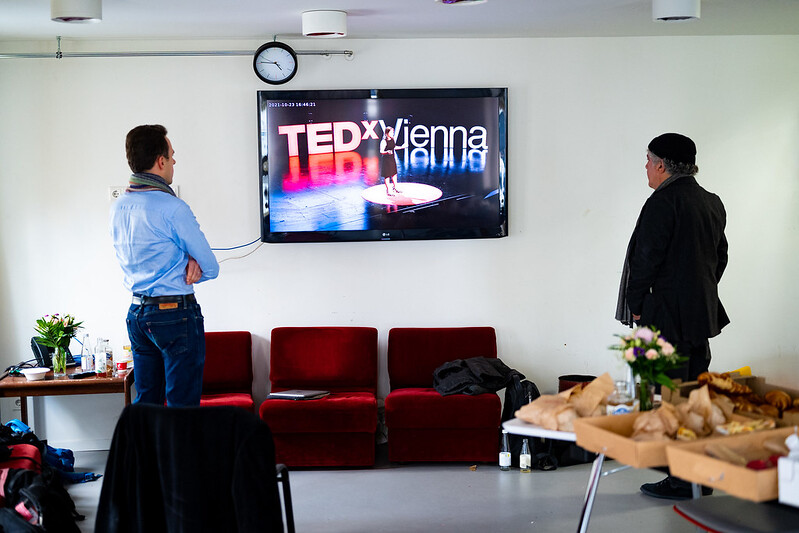
In my family, it started pretty early. We talked about “I took a picture of you, do you want grandma and grandpa to see this?” Of course, I didn’t do that with my oldest. I shared way too much with my oldest. But with my younger ones, I would try to bring it into a conversation.
I realized that you can also over-involve your kids in your decisions as to what to share. I don’t want to be constantly asking them and making them think about social media either. So I think that it is going to be specific to the child and specific to the family.
The most important thing parents can do is just to be mindful.
In what way did this ‘sharenting’ research change your habits in your day-to-day life?
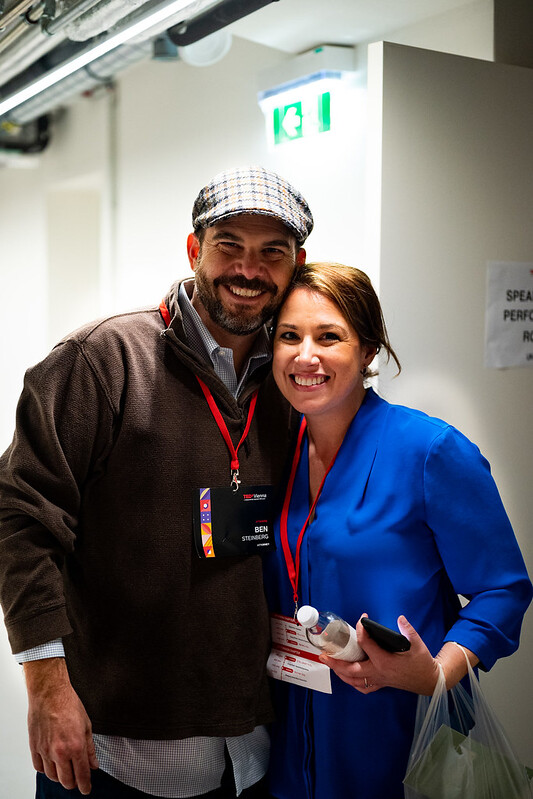
So when I started it, I expected to walk away from ever wanting to share again. And that didn’t happen. I think that I saw how complex the topic is and how some families share for a lot of different reasons.
But I think it has changed how I share because I am thinking about it more. I definitely share less than before now, but I still do share.
Do your children also take this incentive from you and ask you, your husband or whoever is taking pictures of them for their consent?
It is hard to say because they’re still in the process of going through that. I think my oldest does, absolutely. He is the only one that’s really on social media.
But I hope that they are. It is hard to really say how my research will impact them and I am trying not to put too much pressure on them.
But my hope is that I’ve modeled their sharenting choices and that will help them make better sharenting choices.
What happens when you look back and realize you maybe shouldn’t have shared all these images and info of your children? What would you suggest for all those parents who have already shared too much?
One of the things that I do is try to go back and delete anything that is more than a year old, unless I really want that to be out there.
I try to be mindful of not only what I have posted now but also of what I posted five years ago.
I think parents can take advantage of the opportunities right now to delete things. It may not always be that way, but right now, on Facebook, for example, you can archive posts so that they still show up for your memories but that your friends and family don’t see them.
Or you can just take the most drastic step and delete those pictures. I think nothing is ever really gone from the internet, but I feel a little bit better knowing that there is less out there.
During your talk, you shared five tips on how parents can be more mindful about “sharenting”. What do you suggest parents do to protect their children’s privacy when other people share pictures of their child?
I think that parents should be talking to the people who are around their kids about this, just like they are going to talk to these people about what their children would like to eat or what disciplines might work best or what the child likes to do or not do.
If we can have those conversations early on with the other adults in our children’s lives we can avoid a lot of conflicts.
In my book, I also suggest that if someone shares something about your child without your “blessing,” that you can get angry but you could also use it as an opportunity to have a conversation. One of the things that I say in my talk that has really stuck with me is that:
Parents don’t overshare because they are malicious, they just haven’t yet considered the importance of their child’s digital footprint.
When somebody who’s not a parent shares a picture or information about your child, and you are not happy with it, consider that they are not doing it maliciously. They simply haven’t yet heard my talk or read my book (laughs).
Since you mentioned your book, let’s talk a bit about the book. How did the whole project start?
The research found its genesis in self-reflection. I’ve always been focused on children’s rights in the law but I’ve also been very focused on telling my story. I had a blog when my youngest son was born. I love photography, I love sharing pictures.
So, when I was sharing, I was actually writing for the Huffington Post at the time and Washington Post, I was writing about motherhood. I started to question whether I was putting my children’s privacy in jeopardy by doing it.
But I also saw first-hand the power of narratives and why it is so important that we don’t shy away from telling our stories. So, that’s where it started.
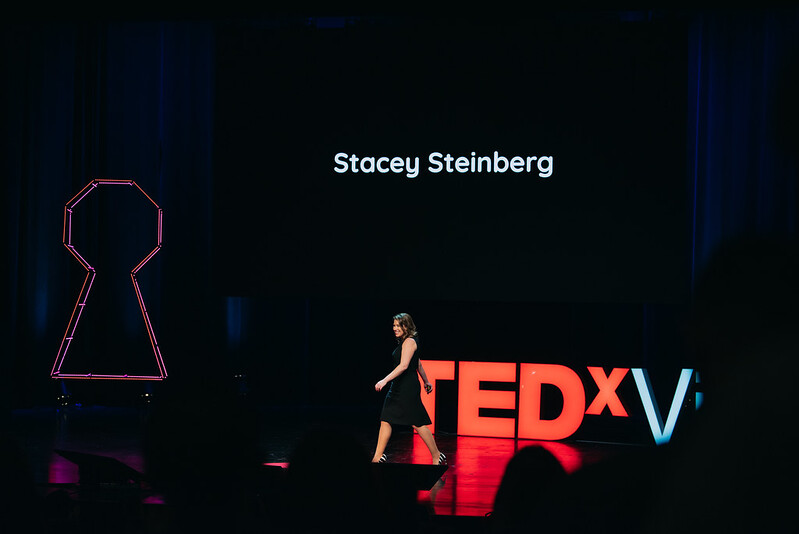
Growing Up Shared: How Parents Can Share Smarter on Social Media and What You Can Do to Keep Your Family Safe in a No-Privacy World
I was really fortunate. I had a lot of support from my university to explore this as an academic and that encouragement from the university really led me to first research this as a law professor and led to an article that was published around 2016.
Then I partnered with Dr. Bahareh Keith, a pediatrician who was actually somebody who had referred me to some of the children that I was taking pictures of and the two of us together presented our research to the American Academy of Pediatrics and we published our findings in JAMA Pedriatics, which is a medical journal that is pretty well-received.
Then we had these two different angles: the medical side and the legal side.
I was always amazed whenever I would speak with other parents, journalists, academics, policy-makers, or teens. I am a law professor so I would speak with young adults. And this was a topic that resonated with so many.
It was a topic I was ready to stop researching at different points, but the conversation just got more and more interesting.
So, the book was really a combination of my experiences as a mom, my experiences as a photographer to some incredible families who trusted me to take their children’s pictures, and my thoughts as an attorney.
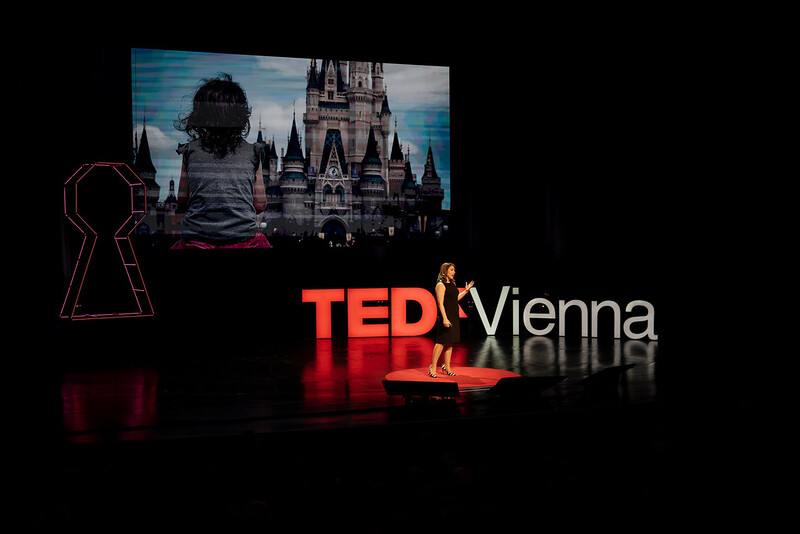
By the end of the interview, we talked about the importance of learning how to be more present with your own children and not miss those special moments in their lives. Stacey then shared an “Aha” moment she had the night before her TEDxVienna Talk:
I had an “Aha” moment yesterday when I was realizing that you weren’t going to be live-streaming this (The TEDxVienna Untold Event), and that I wasn’t going to see my video right away afterward. And I was like, “Oh, my husband needs to record it so I can see it.”
But my tip number two is to stay in the moment, not in the newsfeed.
So when you asked me “How do you feel” right after the talk, I feel excited, and I feel like I remember what it was like to be on stage and that my shoes were really hurting.
And I remember connecting with the audience, and that’s the way I want to remember it right now.
Here’s Stacey’s full talk at TEDxVienna UNTOLD:
To keep up with Stacey’s updates, visit her website here.

